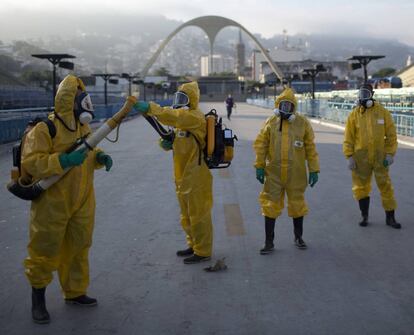Olympic dream or medical nightmare?

Returning to Spain after eight months in the United States, I am struck by how few people in Europe are talking about the Zika virus and its consequences. I’m surprised by the lack of coverage in the media and by its absence from public debate. Fortunately, organizations such as the US Center for Disease Control and Prevention (CDC) which are constantly working to analyze the virus’ evolution, among others, are publicly sharing some information that we should bear in mind. When I read for example, that the CDC’s director, Dr Tom Frieden, is calling on the US government for a big increase in funding to deal with Zika, comparing the epidemic to “being next to somebody who is drowning and that you could save but are unable to,” then I get an idea of the reality we face.
My conclusion is that Zika is a much bigger and more serious threat than we think. We know very little and we aren’t as worried as we should be
From my conversations with both US and Spanish experts, my conclusion is that Zika is a much bigger and more serious threat than we think. We know very little and we aren’t as worried as we should be. That said, Zika is hardly new. The epidemic is a reality. It has been around now for more than a year and has spread to 60 countries. The presence of cases in Spain, in Catalonia, Andalusia, the Basque Country, and Castellón doesn’t seem to have raised any awareness.
Our lack of knowledge about the virus is almost total: obviously, we know about the terrible damage it causes to fetuses: the photographs of recently born babies with microcephaly are deeply moving. But that is all the general public knows about it. Few people know that it can lead to the Guillain-Barré syndrome, which provokes temporary paralysis and can be deadly. Few know that it is possible to be infected without showing any symptoms, given that this is the case with four out of five infected people, or that the virus is transmitted sexually, even months after being infected. This has all been documented by the WHO, the CDC, the New England Journal of Medicine and other publications and organizations, none of which leave any doubt about the threat it poses. I would recommend reading the WHO’s website about Zika.

In the midst of what the WHO calls a “global health emergency,” come the Olympic Games. Some 150 experts from around the world have written to the International Olympic Committee recommending that the event be postponed or held in a less-exposed city than Rio, because the epidemic, reads the letter, will spread even faster as a result of the Games. There are some parallels between the Zika epidemic and others such as dengue or chikungunya, which are also present in Brazil. The WHO’s response has been to play down the dangers. It says that half a million people from all over the planet visiting Rio will have no consequences when they return home. International health and sporting organizations, as well as governments, are aware of the risks. If the Olympic Games go ahead as planned, it won’t be for lack of information about the situation. But then who’s worried about the athletes and fans headed for Rio?
Some countries are “concerned” about their athletes, albeit to varying degrees. Australia will be handing out condoms, and South Korea has come up with anti-mosquito suits for the opening ceremony. Such anecdotal measures are nothing if not deeply worrying in the face of such a serious situation.

Some athletes have already made public their intentions: US soccer player Hope Solo recently said that if the Games are held at this time, he won’t be going. Golf player Marc Leishman, whose wife nearly died after contacting Zika, has said he won’t be attending the first Games at which golf will be present after a 112-year absence. Other athletes, such as my NBA colleague Carmelo Anthony or tennis champion Serena Williams, both of who are part of the US Olympic team, have expressed their fears.
The Olympic Games are the most important event for any athlete. Not attending would be devastating for any high-level athlete who has dedicated his or her life to those few minutes, or even seconds, of competition, and I’m not just talking about the health of each athlete, but also the fans, the families of athletes who will be in Rio, the families that will return when the competition is over, as well as future generations…
Are we taking the precautions that will guarantee the health and safety of fans, athletes and other professionals who will travel to Rio, or are we putting financial concerns first?
In conclusion, allow me to ask a question that so far nobody has come up with a satisfactory answer to: are we taking the precautions that will guarantee the health and safety of fans, athletes and other professionals who will travel to Rio, or are we putting financial concerns above the health of millions of people around the world? These Olympic Games, the first to be held in South America, could be unforgettable; the risk is that this could be for all the wrong reasons.
Now is the time to raise awareness and to have an open debate based solely on the facts and with the goal of protecting lives and the health of our population: fear can only be defeated through knowledge. We have to take decisions and measures so that the Olympic dream doesn’t become a medical nightmare.
English version by Nick Lyne.
Tu suscripción se está usando en otro dispositivo
¿Quieres añadir otro usuario a tu suscripción?
Si continúas leyendo en este dispositivo, no se podrá leer en el otro.
FlechaTu suscripción se está usando en otro dispositivo y solo puedes acceder a EL PAÍS desde un dispositivo a la vez.
Si quieres compartir tu cuenta, cambia tu suscripción a la modalidad Premium, así podrás añadir otro usuario. Cada uno accederá con su propia cuenta de email, lo que os permitirá personalizar vuestra experiencia en EL PAÍS.
¿Tienes una suscripción de empresa? Accede aquí para contratar más cuentas.
En el caso de no saber quién está usando tu cuenta, te recomendamos cambiar tu contraseña aquí.
Si decides continuar compartiendo tu cuenta, este mensaje se mostrará en tu dispositivo y en el de la otra persona que está usando tu cuenta de forma indefinida, afectando a tu experiencia de lectura. Puedes consultar aquí los términos y condiciones de la suscripción digital.








































